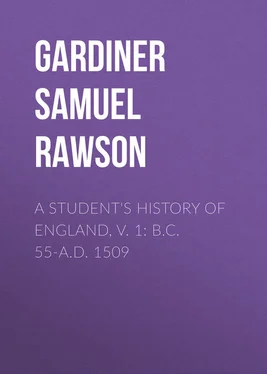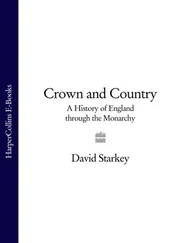Samuel Gardiner - A Student's History of England, v. 1 - B.C. 55-A.D. 1509
Здесь есть возможность читать онлайн «Samuel Gardiner - A Student's History of England, v. 1 - B.C. 55-A.D. 1509» — ознакомительный отрывок электронной книги совершенно бесплатно, а после прочтения отрывка купить полную версию. В некоторых случаях можно слушать аудио, скачать через торрент в формате fb2 и присутствует краткое содержание. Издательство: Иностранный паблик, Жанр: foreign_prose, История, foreign_antique, на английском языке. Описание произведения, (предисловие) а так же отзывы посетителей доступны на портале библиотеки ЛибКат.
- Название:A Student's History of England, v. 1: B.C. 55-A.D. 1509
- Автор:
- Издательство:Иностранный паблик
- Жанр:
- Год:неизвестен
- ISBN:нет данных
- Рейтинг книги:5 / 5. Голосов: 1
-
Избранное:Добавить в избранное
- Отзывы:
-
Ваша оценка:
- 100
- 1
- 2
- 3
- 4
- 5
A Student's History of England, v. 1: B.C. 55-A.D. 1509: краткое содержание, описание и аннотация
Предлагаем к чтению аннотацию, описание, краткое содержание или предисловие (зависит от того, что написал сам автор книги «A Student's History of England, v. 1: B.C. 55-A.D. 1509»). Если вы не нашли необходимую информацию о книге — напишите в комментариях, мы постараемся отыскать её.
A Student's History of England, v. 1: B.C. 55-A.D. 1509 — читать онлайн ознакомительный отрывок
Ниже представлен текст книги, разбитый по страницам. Система сохранения места последней прочитанной страницы, позволяет с удобством читать онлайн бесплатно книгу «A Student's History of England, v. 1: B.C. 55-A.D. 1509», без необходимости каждый раз заново искать на чём Вы остановились. Поставьте закладку, и сможете в любой момент перейти на страницу, на которой закончили чтение.
Интервал:
Закладка:
17. Oswald and Aidan.—In the days of Eadwine, Oswald, as the heir of the rival house of Bernicia, had passed his youth in exile, and had been converted to Christianity in the monastery of Hii, the island now known as Iona. The monastery had been founded by Columba, an Irish Scot. Christianity had been introduced into Ireland by Patrick early in the fifth century. Ireland was a land of constant and cruel war between its tribes, and all who wished to be Christians in more than name withdrew themselves into monasteries, where they lived an even stricter and more ascetic life than the monks did in other parts of Western Europe. Bishops were retained in the monasteries to ordain priests, but they were entirely powerless. Columba's monastery at Hii sent its missionaries abroad, and brought Picts as well as Scots under the influence of Christianity. Oswald now requested its abbot, the successor of Columba, to send a missionary to preach the faith to the men of North-humberland in the place of Paulinus, who had fled when Eadwine was slain. The first who was sent came back reporting that the people were too stubborn to be converted. "Was it their stubbornness or your harshness?" asked the monk Aidan. "Did you forget to give them the milk first and then the meat?" Aidan was chosen to take the place of the brother who had failed. He established himself, not in an inland town, but in Holy Island. His life was spent in wandering amongst the men of the valleys opposite, winning them over by his gentleness and his self-denying energy. Oswald, warrior as he was, had almost all the gentleness and piety of Aidan. 'By reason of his constant habit of praying or giving thanks to the Lord he was wont whenever he sat to hold his hands upturned on his knees.' On one occasion when he sat down to a feast with Aidan by his side, he sent both the dainties before him and the silver dish on which they had been served to be divided amongst the poor. "May this hand," exclaimed the delighted Aidan, "never grow old!"
18. Oswald's Greatness and Overthrow.—As a king Oswald based his power on the acknowledgment of his over-lordship by all the kingdoms which were hostile to Penda. In 635Wessex accepted Christianity, and the acceptance of Christianity brought with it the acceptance of Oswald's supremacy. Penda was thus surrounded by enemies, but his courage did not fail him, and in 642at the battle of Maserfield he defeated Oswald. Oswald fell in the battle, begging with his last words for God's mercy on the souls of his enemies.
19. Penda's Overthrow.—After Oswald's fall Bernicia was ruled by his brother Oswiu. Deira, again divided from it, was governed first by Eadwine's cousin Osric, and then by Osric's son, Oswini, who acknowledged Penda as his over-lord. Oswini was a man after Aidan's own heart. Once he gave a horse to Aidan to carry him on his mission journeys. Aidan gave it away to the first beggar he met. "Is that son of a mare," answered Aidan to the reproaches of the king, "worth more in your eyes than that son of God?" Oswini fell at the bishop's feet and entreated his pardon. Aidan wept. "I am sure," he cried, "the king will not live long. I never till now saw a king humble." Aidan was right. In 651Oswini was slain by the order of King Oswiu of Bernicia, who had long engaged in a struggle with Penda. Penda had for some years been burning and slaughtering in Bernicia, till he had turned a quarrel between himself and Oswiu into a national strife. Oswiu rescued Bernicia from destruction, and after Oswini's murder joined once more the two kingdoms together. Oswini was the last heir of Ælla's house, and from that time there was but one North-humberland. In 655Oswiu and Penda met to fight, as it seemed for supremacy over the whole of England, by the river Winwæd, near the present Leeds. The heathen Penda was defeated and slain.
20. The Three Kingdoms and the Welsh.—For a moment it seemed as if England would be brought together under the rule of Oswiu. After Penda's death Mercia accepted Christianity, and the newly united Mercia was split up into its original parts ruled by several kings. The supremacy of Oswiu was, however, as little to be borne by the Mercians as the supremacy of Penda had been borne by the men of North-humberland. Under Wulfhere the Mercians rose in 659against Oswiu. All hope of uniting England was for the present at an end. For about a century and a half longer there remained three larger kingdoms—North-humberland, Mercia, and Wessex, whilst four smaller ones—East Anglia, Essex, Kent, and Sussex—were usually attached either to Mercia or to Wessex. The failure of North-humberland to maintain the power was no doubt, in the first place owing to the absence of any common danger, the fear of which would bind together its populations in self-defence. The northern Kymry of Strathclyde were no longer formidable, and they grew less formidable as years passed on. The southern Kymry of Wales were too weak to threaten Mercia, and the Welsh of the south-western peninsula were too weak to threaten Wessex. It was most unlikely that any permanent union of the English states would be brought about till some enemy arose who was more terrible to them than the Welsh could any longer be.
21. The English Missionaries.—Some preparation might, however, be made for the day of union by the steady growth of the Church. The South Saxons, secluded between the forest and the sea, were the last to be converted, but with them English heathenism came to an end as an avowed religion, though it still continued to influence the multitude in the form of a belief in fairies and witchcraft. Monasteries and nunneries sprang up on all sides. Missionaries spread over the country. In their mouths, and still more in their lives, Christianity taught what the fierce English warrior most wanted to learn, the duty of restraining his evil passions, and above all his cruelty. Nowhere in all Europe did the missionaries appeal so exclusively as they did in England to higher and purer motives. Nowhere but in England were to be found kings like Oswald and Oswini, who bowed their souls to the lesson of the Cross, and learned that they were not their own, but were placed in power that they might use their strength in helping the poor and needy.
22. Dispute between Wilfrid and Colman. 664.—The lesson was all the better taught because those who taught it were monks. Monasticism brought with it an extravagant view of the life of self-denial, but those who had to be instructed needed to have the lesson written plainly so that a child might read it. The rough warrior or the rough peasant was more likely to abstain from drunkenness, if he had learned to look up to men who ate and drank barely enough to enable them to live; and he was more likely to treat women with gentleness and honour, if he had learned to look up to some women who separated themselves from the joys of married life that they might give themselves to fasting and prayer. Yet, great as the influence of the clergy was, it was in danger of being lessened through internal disputes amongst themselves. A very large part of England had been converted by the Celtic missionaries, and the Celtic missionaries, though their life and teaching was in the main the same as that of the Church of Canterbury and of the Churches of the Continent, differed from them in the shape of the tonsure and in the time at which they kept their Easter. These things were themselves unimportant, but it was of great importance that the young English Church should not be separated from the Churches of more civilised countries which had preserved much of the learning and art of the old Roman Empire. One of those who felt strongly the evil which would follow on such a separation was Wilfrid. He was scornful and self-satisfied, but he had travelled to Rome, and had been impressed with the ecclesiastical memories of the great city, and with the fervour and learning of its clergy. He came back resolved to bring the customs of England into conformity with those of the churches of the Continent. On his arrival, Oswiu, in 664, gathered an assembly of the clergy of the north headed by Colman, Aidan's successor, to discuss the point. Learned arguments were poured forth on either side. Oswiu listened in a puzzled way. Wilfrid boasted that his mode of keeping Easter was derived from Peter, and that Christ had given to Peter the keys of the kingdom of heaven. Oswiu at once decided to follow Peter, lest when he came to the gate of that kingdom Peter, who held the keys, should lock him out. Wilfrid triumphed, and the English Church was in all outward matters regulated in conformity with that of Rome.
Читать дальшеИнтервал:
Закладка:
Похожие книги на «A Student's History of England, v. 1: B.C. 55-A.D. 1509»
Представляем Вашему вниманию похожие книги на «A Student's History of England, v. 1: B.C. 55-A.D. 1509» списком для выбора. Мы отобрали схожую по названию и смыслу литературу в надежде предоставить читателям больше вариантов отыскать новые, интересные, ещё непрочитанные произведения.
Обсуждение, отзывы о книге «A Student's History of England, v. 1: B.C. 55-A.D. 1509» и просто собственные мнения читателей. Оставьте ваши комментарии, напишите, что Вы думаете о произведении, его смысле или главных героях. Укажите что конкретно понравилось, а что нет, и почему Вы так считаете.












